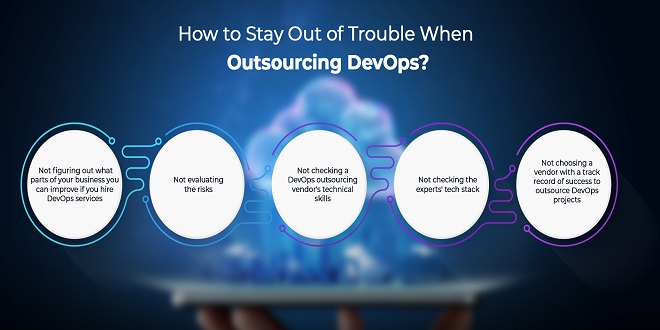DevOps Outsourcing Tips

DevOps are a powerful tool that automates many web development processes, speeds up product launches and controls web product quality. It is a key driver of digital transformation and provides businesses of all sizes with a framework to improve their operations and processes.
But, setting up DevOps in the workplace can be a long and costly project. It’s even more difficult if you have multiple teams and cannot unify them under one roof or a single IT infrastructure. This is why DevOps outsourcing services might be a good option. It gives you automation, flexibility, affordability, as well as the benefit of being flexible.
What does DevOps offer?
You must first evaluate your DevOps toolkit as well as your business processes. This audit will allow you to determine if DevOps is necessary and give you an idea of potential benefits. Companies are seeing improvements in these areas following their transition to DevOps.
Savings in time and money
Security improvements
Digital products are quicker to market
Quality monitoring – Automated and custom
Resilience for business
Greater agility
Business processes that are innovation-focused
Quick delivery of error-free products
Web solutions that scale easily
Performance improvements
DevOps is a solution if you find flaws in any one of these points, and wish to improve your business performance. It’s time for you to start thinking about DevOps. Here are some ways you can do it.
Credit: Auxis
What can you expect from DevOps Outsourcing
The fundamental organizational transformation required to adopt the DevOps mindset does not have to be a prerequisite for adoption. You can choose to use DevOps as an option if you don’t have the budget for a dedicated DevOps staff. This means that you pay a monthly subscription fee for DevOps functionality. You can use the resources you have and the skills and talents of the provider to set up the DevOps setup.
Consider all possible outsourcing options and compare the available options. Finally, verify that your provider offers a guarantee.
Better consistency in software deliveries.
Automating routine business tasks
Enhancement and optimization of IT architecture
Reduced system complexity to speed up workflow.
Quick and productive troubleshooting.
Steps to Effective Outsourcing of DevOps
There is no one right way to do DevOps outsourcing. However, it is important to focus on the most important milestones. These are key to successful DevOps integration. They will ensure that your organization reaps all the benefits for productivity and organizational performance.
#1 Establish an organizational framework with the DevOps TOM
The key concept of DevOps is the Target Operating Model (or TOM). It encompasses the entire network of people, processes, functions, tools, and other elements that your DevOps strategy should unify and automate. You can improve the governance of your system and get better organizational results by using TOM elements.
#2 Assess your organization’s readiness
Once the DevOps strategy has been established, it is time to assess the capabilities of the provider and your readiness to make changes in all areas. You need to assess the infrastructure and fix any problems that may exist if you plan to implement CI/CD tools into your workflow.
Also, it is important to assess your organizational capabilities. This includes cloud servers, quality assurance processes and automation approaches. Your DevOps provider can help you set up the right process components to maximize DevOps benefits.
#3 Get involved with the team
DevOps refers to a culture that is open to fundamental cultural changes within a company. You must create the conditions for a culture shift in your team. This can be done by assigning process champions and change agents. A provider’s expert can also be added to the team, who will train and prepare the change agents for greater DevOps knowledge sharing.
Because the change is managed by team members and not senior managers, it makes it easier. The change agents also conduct education and training on DevOps usage on the job, which empowers staff and reduces their resistance to change.
#4 Talk to the DevOps provider about pricing
Financial aspects are the final aspect of DevOps outsourcing. The provider and you must agree on a mutually beneficial work arrangement that is both financially and organizationally acceptable. You can opt for a time-and-material (T&M), arrangement that only provides tools to support DevOps setup within your organization. A dedicated team model is another option. This requires collaboration between your organization, the provider and their team to achieve the correct DevOps setup.
Powerful Customization
DevOps outsourcing offers the best in terms of customization. You can now tailor DevOps to your business’s needs and scale the services in a way that suits your company’s structure and goals. You have the following options available in your DevOps package:
Planning and strategic consulting for DevOps integration.
Cloud service implementation.
Infrastructural automation.
The management of a DevOps optimal configuration.
Implementing CI/CD components into your workflow.
DevOps can be customized to suit your needs. This gives you many options for business growth and automation. DevOps can lead to process acceleration and improvement in business workflows, innovation, and that is one thing that is certain. It’s something that every business dealing with software development should consider. DevOps provides solutions to all issues and eliminates bottlenecks. This will result in better quality products.





